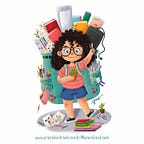AI writing and how to use it?
There is a lot of talk about AI writing these days. With AI becoming more prevalent in the writing industry, people are worried about losing creativity, ethics, authenticity, and jobs. I will not deny any of it, as many have been replaced by AI in the past few years, or at least the number of job positions have already been replaced by AI in recent years.
However, this isn’t the first time that something has affected jobs. The start of the computer era also resulted in a similar trend, where humans were replaced by computers. Soon after, the software industry took over the world, creating numerous opportunities.
History may repeat itself, but there’s no need to wait because all is not lost. It’s time to leverage AI for your benefit. AI can be incredibly helpful in various ways, such as aiding with basic tasks like correcting grammar and spelling and suggesting sentence structures. However, it can also be utilized in different ways.
In place of using AI to write an entire article, consider leveraging it as a brainstorming partner and a research tool. Ask AI about topics or questions relevant to your writing. Keep in mind that its output may not always be directly applicable. Since AI lacks the ability to ask questions, human involvement is still crucial in the industry. Humans can debug, simplify, and guide the AI to achieve the desired outcome. Utilize this capacity to direct AI toward your desired results.
You can also use AI to generate survey questions on specific research topics. Once you obtain a set of questions, ask for additional ones. AI may rephrase some questions and present them to you, so it’s essential to review all of them. Identify the questions that align with your research goals and eliminate any that are irrelevant or redundant. This process will help you pinpoint the key areas to explore in your research.
Here’s an experiment I conducted with AI to illustrate these points.
I consulted ChatGPT to suggest a research topic on UX writing. It not only provided a relevant topic but also offered research questions, methodologies, expected outcomes, and practical applications.
I was given the above output because my input was vague.
Let’s try differently. This time, I provided more specific input.
I asked the below specific question,
“Give me a list of research topics on UX writing aiming to display the effect of microcopy.”
This question specifically requests the effect of microscopy.
Because of my specific input, I have received more relevant topics. Now, pick a topic you like and ask what questions should be addressed under that topic.
I now asked it, “What questions do I need to address in my research on “The Role of Microcopy in Reducing User Error Rates in Online Forms?””
It provided me with various explanations, some helpful and some not. Take the useful information and move forward with the research. If you feel like you didn’t find the answer you’re looking for, try presenting your input in different ways. You can even close the chat and open a new window to avoid duplication of response. Consider factors like the audience, the desired outcome, the preferred sentence style, and more as inputs. The more specific you are, the better the output you will receive. This is not only for researchers and PhD students but also for freelancers who need to write lengthy essays on specific topics. It can be challenging to switch between different subjects, and this is where AI can help. Using AI to brainstorm is not a bad idea, but we need to ensure it makes sense on a human level and that we use it ethically. If you mention someone else’s work, provide citations to avoid plagiarism. Try rephrasing sentences without or without AI help. Ask AI for citations; applications like the premium version of Grammarly might provide links to plagiarism sites.
All in all, AI can be a valuable tool when used correctly. However, a human touch in writing is still in demand. That said, if you are a writer, you are needed.
